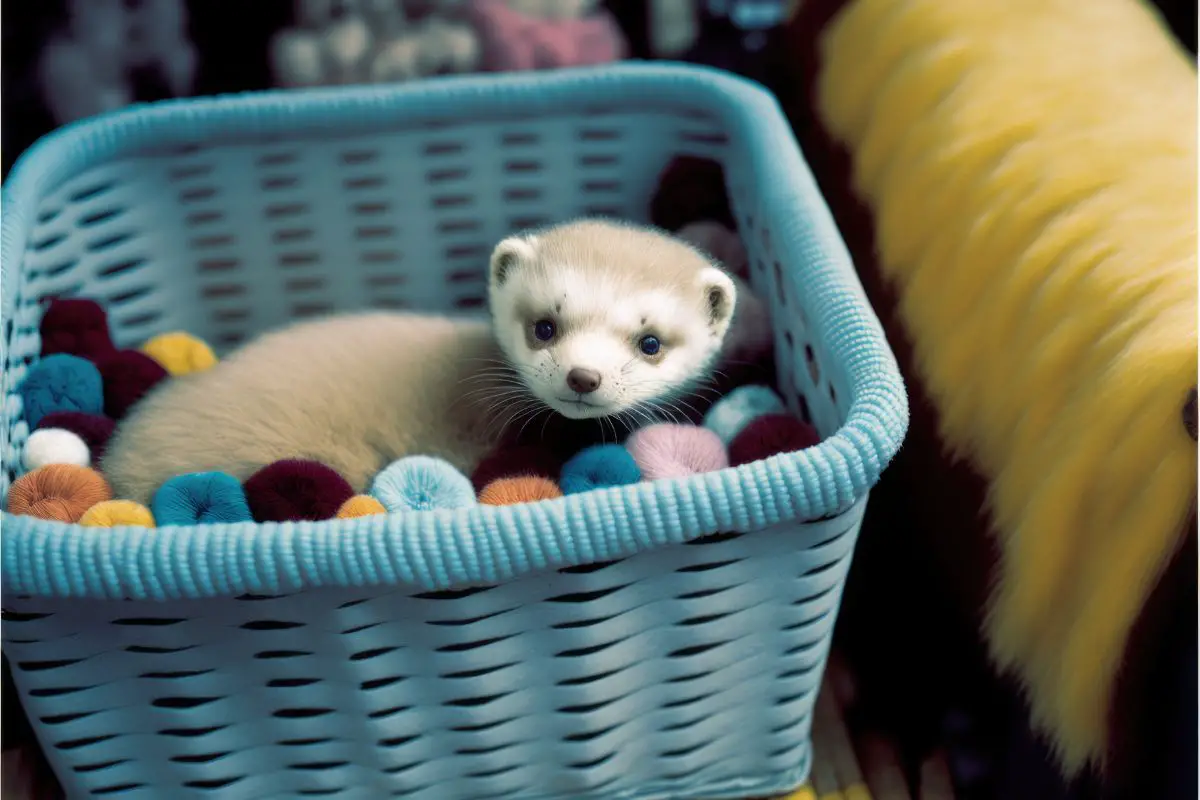Ferret Baby. What You Need To Know

I have written so much about ferret care. However, we haven’t talked about ferret kits. In this article, I am going to outline a guide for caring for a ferret baby. Well, while these pets are popular, most people adopt older ferrets.
It takes so much to take care of a baby ferret, which is referred to as a kit. They are delicate at a young age and thus they require gentle care. This article will highlight everything you need to know about ferret baby care.
Now, I have to mention that ferret breeding is an expert affair. However, if for some reason you have adopted rather a young ferret, it is important you learn the dos and don’ts of raising him. Well, without further delay, let us look at ferrets from birth to weaning.
Ferret birth
As I have mentioned above, breeding ferrets should be done by experienced personnel. Once a female ferret is bred, it will take about 40 days to deliver a litter. Baby ferrets are born blind, deaf and also hairless. At a go, a female can deliver up to 8 ferrets in one litter.
Well, I am not going to talk about breeding today. Rather, let us focus on raising the newly-born kits. They will spend a lot of time with their mother after birth. And it is important for you to allow as much privacy for them. During this time, they enjoy suckling and will sleep for so many hours.
Luckily for you, ferret kits grow quite fast. A 5 months old ferret is relatively the same as a 4-year-old ferret. While most people separate their kits from the mother at 3 months, other people will do it right after weaning.
If you have recently adopted a younger kid, you must pay attention to the rest of this article. We will look at ferret baby care from feeding to the regular health checks you must schedule.
Feeding a baby ferret
Most ferrets are weaned at 6 weeks only! That is pretty young but needs food to enter a period of growth. Now, I am very keen when talking about what to feed ferrets. Baby ferrets should feed on high-quality foods.
Fortunately, you will find ferret-specific foods in your local pet store. And if you do not, you can always order ferret feeds online. After 6 weeks, a baby ferret will need to feed intensely to accelerate growth. Well, if you are a first-time ferret owner, you should know that ferrets feed quite a lot.
Well, at this age, I suggest you go for wet foods instead of the normal dry ferret food. And because this kit is used to suckling from the mother, he might not do well with cold wet foods. You should warm it by dipping it in a bowl with warm water for a few minutes. This will be much comfortable for your ferret to eat.
So, if you are worried about the type of food to buy, I suggest you consult the breeder or pet store technician. I have said it before that it is not advisable to just change a ferret’s diet. It should be gradual and thus the need to know what your kit is used to.
If you want to change it, you should start by introducing the new food gradually. Mix a small number of new feeds with his usual meal. Observe his response as you increase the amount of the new food until his tummy is completely comfortable digesting your preferred type of ferret food.
Unlike other pets, you will need to keep your ferret’s food bowls full. There is no schedule for feeding a ferret.
Baby ferret Housing. (See our recommendations here)
Now, getting a new pet home is quite a task. However, you must think about their housing before you even bring him home. Ferrets practically live in cages as it would be dangerous to leave them to roam freely in the house.
While I might have talked about getting a ferret cage, you might need to be careful when getting one for a kit. Well, I am sure you know that ferrets are pretty small animals. Your kit can and will try to fit between the cage bars.
You should get a ferret cage that is spacious, safe and comfortable. Keep in mind that your ferret is going to spend most of his time there. It should allow your ferret to move around and play freely. It should also have a bed, feeding station and a litter box.
Choosing a cage for a baby ferret
Well, I have already mentioned that ferrets have tiny bodies. They can fit in smaller spaces than you can assume. Therefore, the bar spacing of the cage should not allow your kit to fit in his head. Even if his body might not fit, it puts his life in danger, especially in your absence.
For a baby ferret, go for a solid bottomed cage. Go for a single level cage as it is less likely for your kit to injure himself. Multi-level cages are preferable when keeping an older ferret.
Setting up the cage
Once you finally get the ideal cage for your baby ferret, it is now time to set it up. Choose a calm, away from the windows and a private place to place the cage. When doing so, you must keep safety and serenity in mind. It is because a ferret will spend most of his life asleep.
Install bedding materials. Well, you must make a sleeping nest for your kit. Beddings materials will vary from old fabrics to bought litter. Whichever one you choose, ensure that it facilitates as much comfort as your ferret needs.
Do not forget to set up a litter box for your ferret. You should introduce them to using the box as soon as possible. This should not take much time before he gets used to it. Well, to begin training, wait until your baby ferret eliminates. Scoop the waste and put it in the litter box. You should probably encourage him by placing the litter box right next to where he went earlier on.
And once again, ensure you purchase a ferret-specific litter box. It should have a lower end for easier entry and higher sides to keep the box grounded.
Spaying, neutering and descending
This is one thing about ferrets you should never ignore. Ferret babies are spayed, neutered and descended at 6-7 weeks. It is meant to decrease the popular musky ferret smell. Female ferrets are spared at an early age if they are not meant for breeding.
You must ensure that she has been spayed else you risk her having estrogen toxicity. Once she goes on heat, she will stay that way until she is bread. Failure to do so might lead to a terrible infection.
Well, descending ferret means surgical removal of the anal glands that secrete the smell. All these processes will be done on the same day by a vet. Thereafter, you will need to clean the incisions incurred during spaying or neutering and descending your fuzzy little friend.
Vaccination and medical check-ups
It is essential that you take your ferret to the vet annually unless you have a problem. Well, ferrets are known as healthy pets. However, you should be very keen to ensure that your ferret gets the necessary vaccinations.
The most important vaccination is against canine distemper in ferrets. Usually administered to a 3 weeks old kit, and bolstered three weeks later. Then you must get an annual vaccination shot from your vet.
While ferrets rarely get ill, you must be aware of the signs of a sick ferret. Observe any change in your kit’s behavior every day. If your baby ferret seems sick, take it to the vet for a medical exam. When well handled, a baby ferret will rarely get sick.
Playing with a ferret baby
When you have finally settled with your baby ferret, you must play with them. Note that these pets are very social. Thus, interact with your kit several times a day. You can start handling a baby ferret as young as 3 weeks old.
The key to socializing and playing with your ferret is ensuring that they get used to humans as young as possible. This is where certain behaviors such as nipping are curbed. After all, it is only fair to get them used to human contact at an early age.
Do not forget to purchase your ferret several toys. Go for hard toys, ones that your ferret will not chew or pierce using his nails. You can get cat toys for your ferret’s entertainment. At the same time, I must warn you against using rubber or small toys. Ferrets are curious and will chew through anything.
Swallowing these objects could lead to a gastrointestinal blockage. Therefore, get bigger toys and watch him play in the cage.
Getting a baby ferret is interesting because you get to watch it grow. Furthermore, they are gentle, calm and very adorable. However, caring for a baby ferret can be quite a task. You may consult your vet on further care for your furry little ferret.






